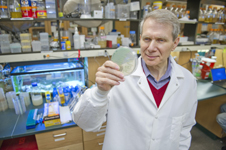Biology researcher named academy fellow

Kim Lewis, professor of biology and director of the Antimicrobial Discovery Center at Northeastern University, has been elected to the American Academy of Microbiology for his body of research on dormant persister cells and uncultured microorganisms.
Fellows of the academy—the honorific leadership group within the American Society of Microbiology—are elected annually through a highly selective peer-reviewed process, based on scientific excellence and scholarly achievement in the field. More than 2,500 Fellows currently represent all branches of microbiology, including basic and applied research, public health and government service.
“The academy is essentially a who’s who in microbiology,” said Lewis. “It feels good to be in this select group.”
As part of his fellowship, Lewis will convene a colloquium to address antimicrobial drug tolerance. Microorganisms, he has found, produce dormant cells, called persisters, which cannot be killed by antibiotics. When treatment for a chronic infection ceases, persisters grow and repopulate, causing relapse.
Both drug tolerance and conventional drug resistance, he said, require development of new antibiotics, which Lewis hopes to discover by screening compounds from previously uncultured species of microorganisms.
Last October, he received a $1.3 million grant from the Human Microbiome Project at the National Institutes of Health to study human-intestine microorganisms that researchers have previously been unable to grow in the lab. Lewis recently identified the first growth factor and is in the process of filing a patent on his discovery.
Lewis also plans to publish papers in mBIO, an online-only journal of the American Society of Microbiology that offers rapid review and publication of the best research in the field. He recently submitted his first paper, a study of tuberculosis pathogens.
“As an academy member, I can publish one paper a year with minimal red tape,” said Lewis. “It’s a useful mechanism for members who want to publish paradigm-shifting research.”
View selected publications of Kim Lewis in IRis, Northeastern’s digital archive.





